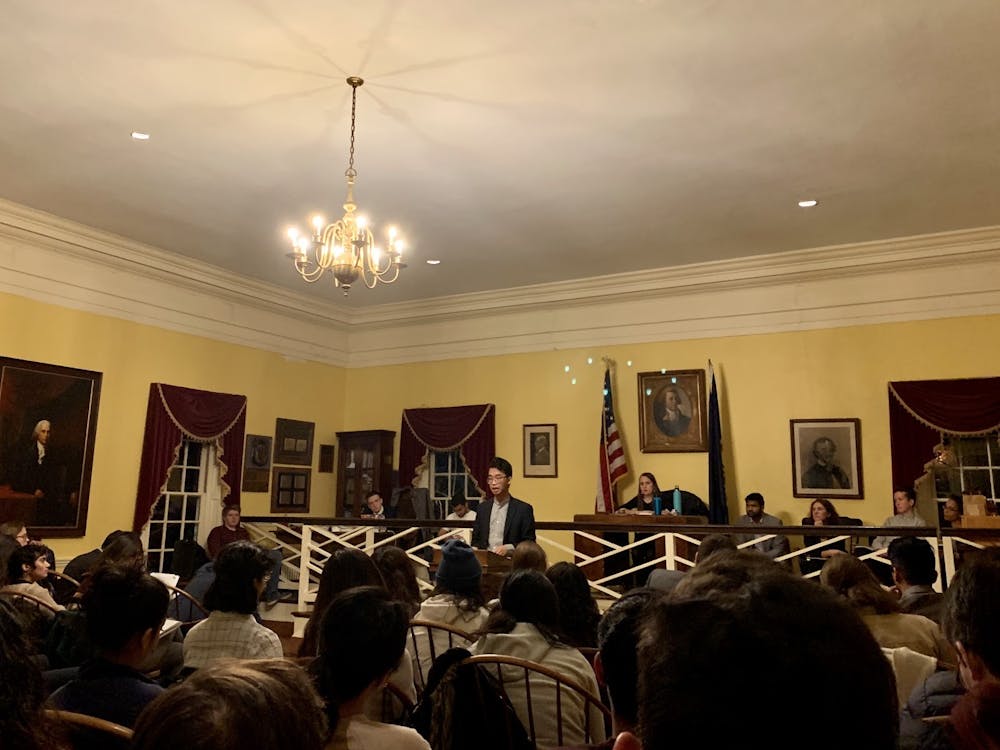The Asian Leaders Council and the Jefferson Literary and Debating Society sponsored a debate Friday evening in Jefferson Hall on the resolution, “Should cultural organizations have an obligation to be political?” Faculty judges and audience voters determined the affirmative side the winner of the debate.
The debate was the final event of the Community MLK Celebration — a month-long celebration of the late Dr. Martin Luther King’s values. The celebration included events hosted by departments and student organizations across the University, as well throughout the Charlottesville community.
The debate began with opening remarks from Vilas Annavarapu, a fourth-year College student, member of the Jefferson Society and outgoing chair of the ALC, who organized the event.
“The purpose of this debate is to reflect upon and engage with Dr. King’s values, not the whitewashed ones, but the ones that drove a man to the mountaintop in his quest for justice,” Annavarapu said.
The debate featured two opposing teams composed of volunteer debaters from the Jefferson Society, the Tamil Student Union, the Chinese Student Association and the Indian Student Association. One side affirmed the resolution, arguing that cultural organizations do have an obligation to be political, while the other negated the resolution.
The debate was centered on what it means to be political versus an activist. Debaters discussed whether or not being a person of color and a member of a cultural organization in a white-dominated space is, in and of itself, a political statement.
The affirmative team argued that cultural organizations exist because of an inherent imbalance in power and thus have a duty to fight for marginalized issues.
“Duties matter,” said Isabella Liu, a second-year College student and a member of the Jefferson Society, in her opening argument for the affirmative side. “In a world without them, people would have no reason to organize and fix things we find intuitively wrong, like racial oppression.”
The negating team argued that cultural organizations can choose to be political but are not inherently obligated to be so.
Ben Borenstein, a fourth-year College student and Jefferson Society member, presented the opening arguments for the negating team.
“You cannot assume that those that any group of individuals that share a similar cultural background will share a similar political background,” Borenstein said.
In the five-minute break between audience questions and rebuttals, the room broke out in debate. Students of diverse cultural and ethnic identities were engaged in heated discussions with those around them, inspired by the discourse at hand.
Fourth-year Engineering student Vikram Seshadri, who attended the event, agreed with the negative. His stance originated from his status as an Indian male in a majority-white society who is not a part of a cultural organization.
“What a cultural society says or does unfortunately reflects what I say,” Seshadri said.
Seshadri noted the highly contested policies of Indian Prime Minister Narendra Modi, who revoked Article 370 of the Indian constitution in August, which had given autonomy to the state of Jammu and Kashmir for the past 70 years. The policy was considered discriminatory by Muslims in the region since it placed all citizens under Modi’s Hindu nationalist control. In December, the Indian government also passed the Citizenship Amendment Bill, which amended India’s citizenship law that had previously prevented illegal immigrants from becoming Indian citizens.
Seshadri expressed his gratitude that the Indian Student Association is not currently taking a stance. The ISA released a statement in August following the abolishment of Article 370 emphasizing the student association’s acceptance of all individuals despite the growing conflict in the South Asian community. The ISA released another statement in December condemning efforts to promote Hindu nationalism and anti-Muslim sentiments.
“While we hope that this statement encourages our membership and the UVA community to further educate themselves and formulate their own opinions about the politics of the situation, we recognize it is impossible to fully encompass the depths of the conflict with this statement,” the statement read. The ISA instead created an online forum for students to discuss Indian politics and its effects.
“If the ISA [took] a stance, they would not feel at home within the community they worked to build across the last three years … which in my opinion is a little destructive,” Seshadri said.
Others have argued that the ISA should have condemned the human rights violations committed by the Modi government and expressed anger towards the treatment of Kashmiris instead of claiming that all students are welcome in the student association.
Although no members of the Black Student Association or Latinx student groups were represented on the debate stage, issues impacting the African American community and the Latinx community were frequently addressed. Annavarapu said that all organizations who co-sponsored the event — which included the BSA, Central Americans for Empowerment, and Political Latinx United for Movement and Action in Society — were contacted to provide debaters.
“I would never consider this to be representative of [all] cultural organizations,” Annavarapu said.
After the event, Borenstein shared that his personal beliefs lie with the affirmative, but he willingly filled a volunteer slot on the negative side for the purpose of the debate. He touched on the Jefferson Society’s past struggles to make students of diverse cultural backgrounds feel welcome.
“The point of the Jefferson Society in general is that these conversations are productive,” Borenstein said, “At its best I think this is what the Jefferson Society should be.”
Annavarapu reflected on the debate’s role as the closing event of the Community MLK Celebration.
“There’s a legacy of Martin Luther King, Jr. as this white-washed figure that calls for a specific type of unity that caters to respectability politics, and that’s not what he stood for at all,” Annavarapu said. “He stood for values of justice and moving society forward, everyone forward.”
Correction: This article previously misstated that the Latinx Student Association co-sponsored the debate. It has been updated to reflect that CAFÉ and PLUMAS were co-sponsors.







